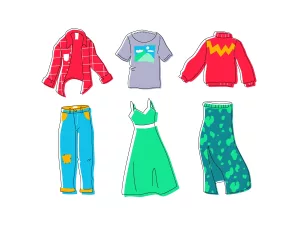By Lucía Nogales Montero
It’s 22:30 when YouTuber Zoe decides to go to bed. She reflects on her activities of the day: filming a “six-pack abs workout” to lose that “stubborn belly fat,” and sharing her ideal prep meals. She falls asleep satisfied, happy to be a role model for young girls who want to become a better version of themselves. While Zoe sleeps, Dana, one of Zoe’s subscribers, meets her high school friends for lunch. However, unlike her friends, Dana doesn’t eat anything. Even though her friends encourage her to eat something, she claims that “if I eat, I will gain fat immediately and will not get the six-pack I’m working on right now.” Dana spends her days avoiding meals that aren’t “healthy” or “low in calories,” and she devotes two hours to intense exercise every day, even though she doesn’t enjoy it.
In the past decades, fitness personalities have become more and more prominent in our societies, and are now commonly dubbed “fitness influencers.” These influencers run channels and accounts encouraging others to work out and engage in healthy habits. While these fitness influencers receive some positive feedback, they also receive their fair share of criticism. So, what are they criticized for? What is wrong with the messages they share?

To find out, a questionnaire about the online fitness industry was sent to a group of 18 to 20-year-olds. According to the 53 results, one common reason why young adults take issue with the fitness industry is the lack of reliable and consistent information provided by influencers. On this topic, one name came up repeatedly: Chloe Ting, a YouTube fitness influencer famous for her workouts that promise abs in just two weeks. One questionnaire respondent said that Chloe Ting “gave teenagers the wrong ideas of how their bodies could look after only a couple weeks of doing her videos.” Another female respondent voiced that she “never really enjoyed or felt that [Chloe Ting’s] workouts were that good, and the way she advertises her videos like ‘Get Abs in 2 Weeks!’ is something unrealistic and unhealthy for teenagers.”
“She has zero understanding of sports science,” said TikToker @Killljoy of Chloe Ting, “Indeed, her nutritional advice has been proven by experts to be ineffective.” The TikToker explains that it is impossible to lose fat when doing muscle-building exercises, and that factors like your height, weight, and body type all play a role in your appearance. Still, Chloe Ting confidently states in her videos that girls can spot reduce belly fat, get a smaller waist and achieve “11-line abs” just by following her 10 minute workouts.
Another issue the survey respondents noted with fitness influencing is the frequent practice of sponsorship. In their videos or posts, influencers often advertise products like protein powders and shakes, many of which are not scientifically proven to be good for people’s health.
In an interview with fitness influencer Jose Cuervo (@jose_cuervoo_), he stated how “fitness influencers may publicize what gets them money, instead of what is good for their followers. They can create and follow trends that are not beneficial to the audiences such as supplements that don’t necessarily work.” Supplement brands choose influencers who look fit– even if they are not professionals in the fitness industry– and sponsor them to increase product recognition.
According to a study by Professor Francisco Abaiza, fitness influencers who are seen as professional and trustworthy among the audience perform well as brand credibility facilitators. This means that the “slim, toned” physique, often attained through the use of synthetic substance abuse, is shown as the ultimate healthy body and lifestyle.
The question of whether fitness figures actually promote healthy lifestyles still remains. What’s clear is that the line is dangerously thin between helpful content that incentivizes healthy habits and content which promotes unhealthy behavior. Even the more educated influencers struggle with communicating their information in the right way. Sofia Valenzuela (@_sofiavalenzue), a Madrid based fitness influencer, affirmed that “sadly anyone can say that they are fitness influencers as there are no special requirements for someone to post fitness videos. Indeed, there are a very small number of certified influencers but even those who are professional sometimes use the wrong wording and the followers get the wrong message.” In light of these realities, it is important to do your own research and find reliable sources to ensure you find your own healthiest path forward.
Featured image: www.youtube.com/@ChloeTing






